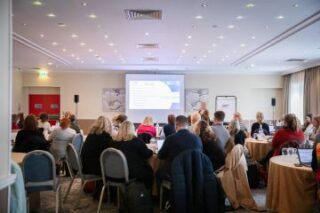Meet the team

Helen Wharam

Johanna Johnson

Sarah Williams
Frances Wiseman
Also:
- Michael Rice
- Matthew O'Reilly
- Craig Reese
- Louise Norris
- Laura George
What is the challenge your project is going to address and how does it connect to the theme of 'How can we improve across system boundaries?
Integration of services across partner organisations and system boundaries is increasingly common. Successful outcomes require services to have a clear understanding of their pathways, flow, demand and capacity, and be able to apply key demand and capacity principles to make effective change that improves access, avoiding pitfalls which have potential to increase waits and delays. Complex integration requires skills that often aren’t well developed:
“People coming to operational roles are often clinicians by background. We (operational managers) don’t have the skills to tackle waiting lists or apply demand and capacity principles to fully understand a service”.
This project will work in partnership with the ICB, services across four merging Trusts and key stakeholders (Local Authorities and the Voluntary Sector). We will develop and evaluate a programme providing operationally driven and improvement focussed demand and capacity training and support for frontline teams, ensuring they have the skills to manage their service.
What does your project aim to achieve?
The key project aims are to:
- Design and deliver a novel demand and capacity training programme with the aim of supporting services to make system pathway changes with potential to optimise flow, manage demand, utilise capacity effectively, and consequently reduce waiting lists. Staff will gain skills and knowledge facilitating continuous proactive, data driven, service demand and capacity planning and management.
2. Facilitate, through partnership working with the Integrated Care Board and other key system partners, joint learning and understanding of complex models of care will lead to improved relationships, communication and joint problem solving.
3. Evaluate outcomes and impact of this training programme, collect lessons learned particularly around system level change, and make recommendations for next steps and the way forwards.
4. Publish programme content, case studies, learning and recommendations
The beneficiaries are service staff who will be empowered to use data to manage and improve services, patients and the broader healthcare system.
How will the project be delivered?
We will take a cohort approach supporting several teams to come together on four training days; augmented with ongoing project facilitation. We would expect services to put forwards a multi stakeholder team including operational and business support leads, team leaders, clinicians/ care professionals and a data analyst. We will strongly encourage representation from our ICB and input from service users.
We aim to support teams to take a whole service and system view; alongside key demand and capacity concepts we will also explore concepts such as job planning, the psychology of queuing, helping patients to wait well, co-production and systems thinking. We will introduce a range of tools to support demand and capacity calculations and scenario planning.
We will provide the demand and capacity, improvement and co-production expertise and external expertise to provide training on systems thinking.
Impact will be measured via case studies and key service measures.
How is your project going to share learning?
This project will include an evaluation for impact and shared learning – both in terms of process and the outcomes. We will produce a guide to programme content, hints and tips for other organisations wanting to provide a similar programme, and we will share critical factors support spread and sustainability. We will produce stories and case studies from participating teams. The evaluation and any resources will be available to any Q members, and we would like to share blogs and workshop content as the programme progresses.
How you can contribute
- Any ideas from anyone who has done something similar (particularly in community services) would be very helpful
Plan timeline
| 14 Jul 2024 | Programme design and scoping |
|---|---|
| 2 Sep 2024 | Start team recruitment process |
| 6 Oct 2024 | Finalise teams and start preparations with teams |
| 4 Nov 2024 | Training programme day 1 |
| 16 Dec 2024 | Training programme day 2 |
| 3 Feb 2025 | Training programme day 3 |
| 11 Mar 2025 | Training programme day 4 |
| 12 Mar 2025 | Post-programme evaluation commences |
| 1 Apr 2025 | Co-design of resources and case studies for sharing |
| 2 Jun 2025 | Publication of evaluation and resources |

Comments
Clifford Mitchell 31 May 2024
I am one of the leads for regional scale and spread programmes in Northern Ireland which brings frontline teams together to improve services and share and learn at pace. Teams use improvement methodologies to improve flow through our services. Frontline teams can really benefit from training and support to understand and develop the skills to improve waiting times and apply demand and capacity principles to fully understand flow.
Good luck with your bid - and looking forward to hearing the outputs and learning!
Carl Adams 24 May 2024
I feel there will a lot of interest in this programme, as like you said many ops leads come from a clinician background so really want to gain skills in demand and capacity of waiting lists and service provision.
You mention the programme will support service to improve how patients wait well and to co-produce changes. Do you have a strong plan in how to involve patients, people and communities with experience of waiting and accessing services? Also in co-production, how you will utilise the strengthens of patients/people with expertise in data, systems etc.
Can't wait to see the outcomes.
Helen Wharam 24 May 2024
Thank you for your question Carl. The reality is that waiting lists will always be present and so, as you have highlighted above, helping patients to wait well is an important aspect of this programme. We have a number of services who have experience of co-producing initiatives to help patients to wait well and we would invite them, alongside the patients/people who undertook the co-production activities with them, to co-design and co-facilitate a workshop session on helping patients to wait well. We want to share stories and outcomes in a way which engages and motivates our teams. Second, we are fortunate to have a Patient Participation team working alongside us and so we will be using their skills and expertise to support teams to embark on some work around helping patients to wait well. Finally, we want our teams to work in a way which plays to each individual's strengths and so a very early activity would be to support teams to explore the strengths and skills of all team members, staff and patient/people participants alike: activities, roles and responsibilities could then be established accordingly.
Corrina 23 May 2024
With so much demand and capacity training already available to operational managers it would be easy to miss the importance of this initiative. What's really exciting is the integrated approach with system partners. Combined with the often complex, often chronic, often long term and often lifelong need for services being delivered by this community and mental health provider, there is an extensive area of new learning to explore. Will the programme be grouped or focused towards specific pathways and how will the impact be measured?
Helen Wharam 24 May 2024
Hello Corinna. Yes, as you have alluded, we do already offer demand and capacity training for our Operational Managers. However, this is a brief one day introduction for individuals within our organisation. What has become increasingly apparent to us is that effective and sustainable solutions to many of the challenges our services are facing requires change across systems. For this reason we want to take the bold step of promoting and exploring a new way of working when it comes to tackling demand, capacity and flow. We don't have any plans to focus this work on specific groups or pathways: we are a large community Trust with wide ranging services and many pathways and we want this offer to be open to all our services. Learning from our Quality Improvement Programme has demonstrated that diversity in programme participants can enhance potential for teams to "think outside the box" and share learning.
Colin Barnes 22 May 2024
This is such an important topic and sounds like you have really thought it through. Great to see you sharing learning and resources from it. Given your trust is merging with another, how are you going to prioritise demand for the programme?
Helen Wharam 24 May 2024
That's a good question Colin! We will have a process by which we will invite teams which are undergoing integration or change in how they work across system boundaries due to our merger to express an interest in the programme. We will then hold discussions with teams to ensure that they 1) have the buy-in from relevant system partners, 2) that they are able to form a multi-professional stakeholder team, 3) that they can commit the time to implement learning into action between, and after completion of, the four training days. We appreciate that this is a big ask of teams/services however, we want to ensure that teams which we take forwards are going to benefit from this opportunity and have a good experience. Having worked through that list, if we are oversubscribed, we will prioritise those services which are being required to undergo the most significant transformation and/or experiencing the most significant demand and capacity challenges.
Lucy Cartwright 21 May 2024
Really excited to see this bid progress, an area close to my heart as we try and increase awareness and capability in demand and capacity as an essential aspects of effective service delivery. This is something we're looking at within our coaching for neighbourhood teams bid to ensure the potential implications of pathway adjustment are fully understand before tests of change commence.
I'm interested in how you will measure the impact of this great piece of work?
Helen Wharam 24 May 2024
Thank you for your question Lucy and it's good to hear that this is something you are also exploring within your work too. Evaluation of impact is important and I see from the questions above that this is becoming a bit of a theme. There are many potential impacts from this work and our measurement plan won't be fully in place until we know which services/teams we are working with and why they are joining the programme. Answering the "why" question we would anticipate to give us some quantitative measures, for example, waiting times or other key service measures. However, we would need to be cautious in our attribution of any changes evidenced due to all of the many other contributing factors over which we have no influence . For this reason we would also measure impact using softer data from discussions/interviews feedback and observation collected as we coach and work alongside the teams. This qualitative data would be collected at the individual, service and system level. This would be collated for each team and presented as case studies sharing activities undertaken, outcomes, impact and learning. We would also seek to producing an overarching summary which would highlight any themes and commonalities across the teams. Finally, we would use feedback from each of the training days as a formative evaluation and use this to continuously improve these days.
Carl Adams 24 May 2024
I am also keen to see how you will measure the impact.
Comments here are now permanently closed.